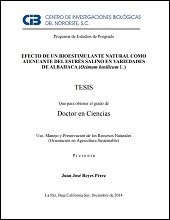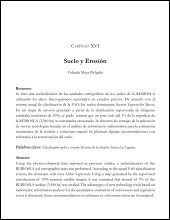Efecto de un bioestimulante natural como atenuante del estrés salino en variedades de albahaca (Ocimum basilicum L.)
Abstract
Los bioestimulantes del crecimiento vegetal son sustancias naturales para el tratamiento de los cultivos como activadores de las funciones fisiológicas, por lo que su aplicación permite un mejor aprovechamiento de los nutrientes y representan una opción adecuada para enfrentar problemas de estrés abiótico por salinidad. Las sustancias húmicas aplicadas a plantas cultivadas, han demostrado que actúan como estimulantes del crecimiento vegetal, especialmente de la raíz, lo que permite una mayor exploración y actividad radical, traducida en una mayor capacidad de absorción de agua y nutrientes, por lo que representan una opción adecuada para enfrentar problemas de salinidad. Actualmente existen disponibles en el mercado, diferentes productos comerciales que contienen ácidos húmicos, ácidos fúlvicos o mezclas de ambos. Se han realizado investigaciones que dan cuenta de los efectos benéficos para el desarrollo de las plantas de dichos bioactivadores húmicos en cada una de las etapas fenológicas y en varias especies de plantas cultivadas. Sin embargo, dichas investigaciones se han realizado, casi en su totalidad, en condiciones hidropónicas ideales y muy escasas en condiciones de campo, sin encontrarse a la fecha, referencias de sus efectos en condiciones de estrés salino. El presente trabajo de investigación contiene estudios en los cuales se comparó la respuesta diferencial a la salinidad en las etapas de germinación, emergencia y en el crecimiento inicial de variedades de albahaca estresadas bajo condiciones de laboratorio, cámara de crecimiento e invernadero. Para determinar la respuesta en cada una de las etapas de crecimiento y seleccionar las variedades tolerantes y sensibles a la salinidad mediante el cálculo del índice de tolerancia para cada una de las variables morfométricas, las diversas variedades fueron expuestas a estrés salino mediante la adición de 0, 50 y 100 mM de NaCl y se utilizaron como criterios comparativos la medición de variables como índices, tasa y porcentaje de germinación, tasa y porcentaje de emergencia, variables morfométricas como longitud, biomasa fresca y seca de la radícula, longitud, biomasa fresca y seca de la parte aérea, índice de tolerancia relativa a la salinidad para las etapas de germinación y emergencia [...] The bioestimulants used for vegetable growth are natural substances for the treatment of cultivations and are activators of physiologic functions, allowing for better use of nutrients and they represent an appropriate option in the face of problems of abiotic stress due to salinity. Humic substances applied to cultivated plants have demonstrated that they act as stimulants of the vegetable growth, especially of the root, alling a bigger exploration and radical activity, which translates into a greater capacity of absorption of water and nutrients; they represent an appropriate option to problems of salinity. At the moment in the commercial market there are different products that contain humic, fulvic or mixtures of both. Research has been carried out investigating the beneficial effects in plant development of these humic bioactivators at different phenological stages in several species of cultivated plants. However, most of these investigations have been carried out, almost in their entirety under ideal conditions and hydeoponic conditions in the field. To the date there is little information of their effects under conditions of saline stress. The present investigation contains studies in comparing stages of plant development sucha as germination, emergence and initial growth of varieties of basil with low salinity stress in laboratory conditions, growth chamber and greenhouse. To determine the answer in each one of the stages of growth and to select the tolerant and sensitive varieties to the mediating salinity the calculation of the index of tolerance for each one of the variable morfométricas, the diverse varieties were exposed to saline stress by means of the addition of 0, 50 and 100 mm of NaCl and they were used as comparative approaches the mensuration of variables as indexes: germination percentage, emergence percentage, morphometrics: length, fresh and dry biomass of the radicle, fresh and dry biomass of the aerial part, index of relative tolerance to the salinity for the germination stages and emergence [...]
Collections
Related items
Showing items related by title, author, creator and subject.
-
PROMOCIÓN DEL PERIFITON PARA EL CULTIVO DE CAMARÓN BLANCO: HACIA UNA ACUICULTURA ECOLÓGICA
DOMENICO VOLTOLINA LOBINA; JUAN MANUEL AUDELO NARANJO; MARIA DEL ROSARIO PACHECO MARGES -
Suelo y Erosión
YOLANDA LOURDES MAYA DELGADO


